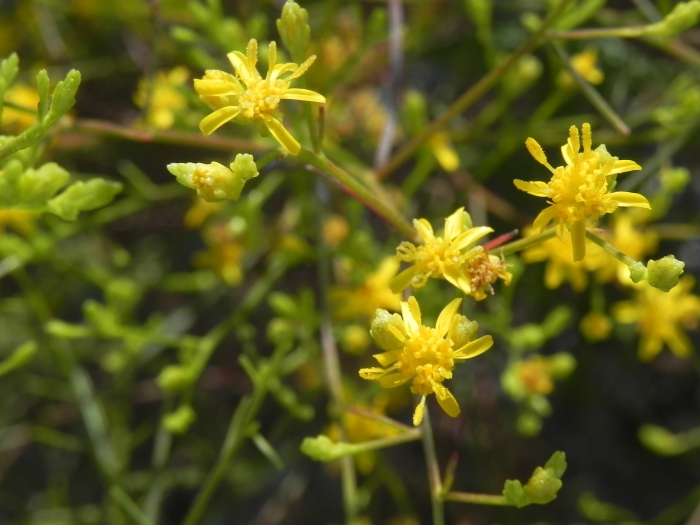San Joaquin Snakeweed
(Gutierrezia californica)
San Joaquin Snakeweed (Gutierrezia californica)
/
/

© James Connolly Davis
CC BY-SA 4.0
Image By:
© James Connolly Davis
Recorded By:
Copyright:
CC BY-SA 4.0
Copyright Notice:
Photo by: © James Connolly Davis | License Type: CC BY-SA 4.0 | License URL: http://creativecommons.org/licenses/by-sa/4.0/ | Uploader: toyonito | Publisher: iNaturalist |

























Estimated Native Range
Summary
Gutierrezia californica, commonly known as San Joaquin snakeweed or California matchweed, is a perennial subshrub native to the chaparral, coastal sage scrub, and grasslands of California, Arizona in the U.S., and Baja California in Mexico. It typically grows in sunny, well-drained sandy or rocky soils and is adapted to dry conditions. This plant reaches up to 2 feet in height and has a bushy appearance with gray and red erect stems lined with small, linear green leaves. From late summer to fall, it produces inflorescences consisting of one to three small flower heads, each with bright yellow disc florets and yellow ray florets around the edge, which are attractive to pollinators.
San Joaquin snakeweed is valued for its drought tolerance and ability to thrive in poor soils, making it suitable for xeriscaping and restoration projects. It is often used in native plant gardens and as a ground cover to stabilize soils. In cultivation, it requires minimal water once established, prefers full sun exposure, and tolerates a range of soil types as long as they are well-drained. There are no widely known cultivars of this species in the horticultural trade. Potential problems include root rot if overwatered and susceptibility to pests such as aphids when stressed. It is not known to be invasive outside its native range, but gardeners should always monitor for any signs of unexpected spread.CC BY-SA 4.0
San Joaquin snakeweed is valued for its drought tolerance and ability to thrive in poor soils, making it suitable for xeriscaping and restoration projects. It is often used in native plant gardens and as a ground cover to stabilize soils. In cultivation, it requires minimal water once established, prefers full sun exposure, and tolerates a range of soil types as long as they are well-drained. There are no widely known cultivars of this species in the horticultural trade. Potential problems include root rot if overwatered and susceptibility to pests such as aphids when stressed. It is not known to be invasive outside its native range, but gardeners should always monitor for any signs of unexpected spread.CC BY-SA 4.0
Plant Description
- Plant Type: Shrub, Herb
- Height: 1-3 feet
- Width: 1-2 feet
- Growth Rate: Moderate
- Flower Color: N/A
- Flowering Season: Spring, Summer, Fall
- Leaf Retention: Deciduous
Growth Requirements
- Sun: Full Sun
- Water: Low
- Drainage: Medium, Fast
Common Uses
Drought Tolerant, Erosion Control, Low Maintenance
Natural Habitat
Native to chaparral, coastal sage scrub, and grasslands in California, Arizona, and Baja California
Other Names
Common Names: California Goldenweed, California Snakeweed, San Joaquin Snakeweed, California Broomweed
Scientific Names: , Gutierrezia californica, Brachyris californica, Gutierrezia bracteata, Gutierrezia californica var. bracteata, Gutierrezia californica var. californica, Gutierrezia divergens, Gutierrezia linearifolia, Xanthocephalum californicum,
GBIF Accepted Name: